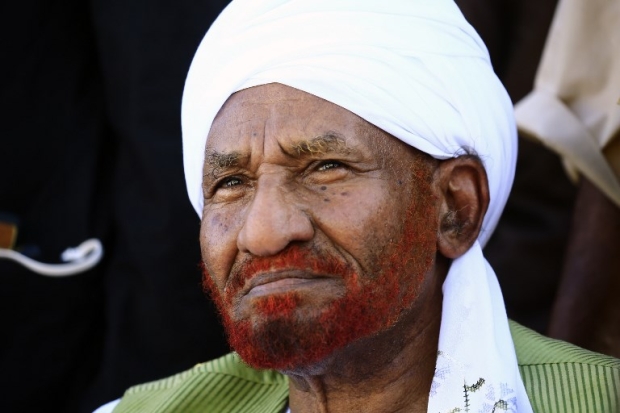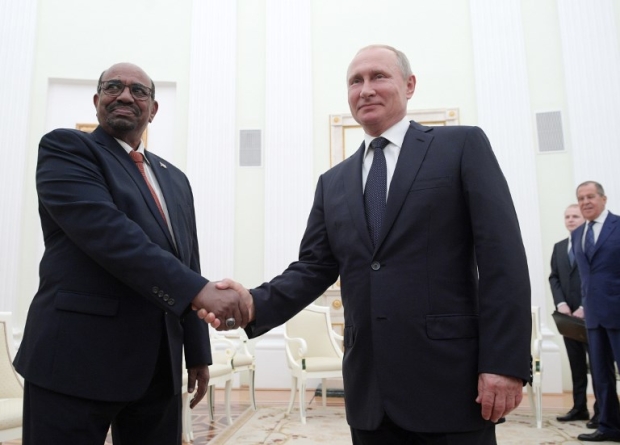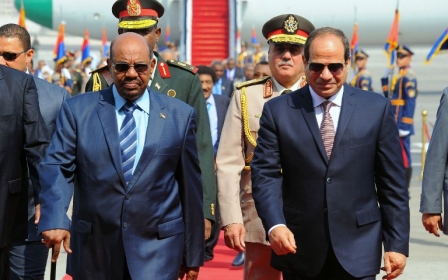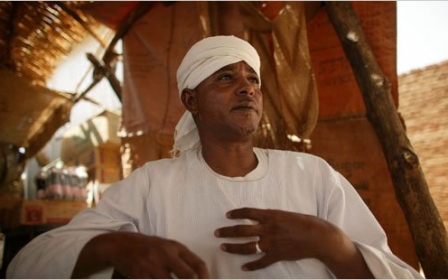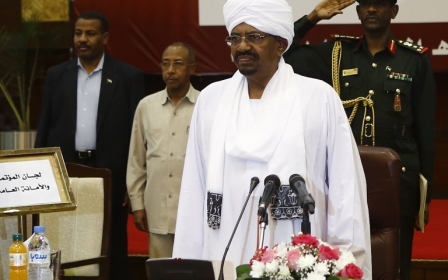Peace or justice? Sudan's opposition is split about Bashir 'soft exit' offer
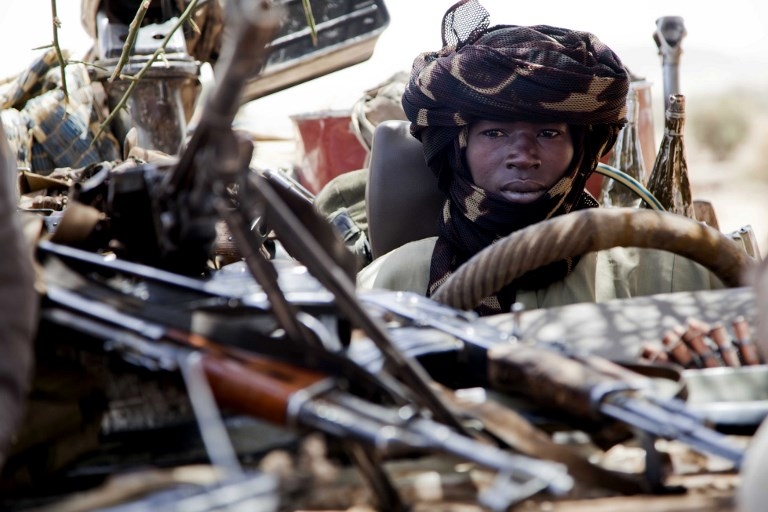
KHARTOUM - A call by Sudan's former prime minister for the International Criminal Court to freeze its indictment against President Omar al-Bashir has been angrily condemned by rebel groups in Darfur and other regions, threatening to split the main opposition alliance and tip the country back into conflict.
Sadiq al-Mahdi, the exiled leader of the National Ummah Party (NUP) and the chair of the Sudan Call alliance, last week suggested that a compromise deal could be struck with Bashir in which the long-time leader would agree to step down in return for the ICC case against him being frozen.
Bashir, who is considered to be “at large” by the United Nations-backed ICC, is wanted by the court over alleged atrocities committed in Darfur between 2003 and 2008 by Sudanese government forces and government-sponsored militias.
The issue of the ICC in Sudan is essential and can’t be ignored, especially as the president is trying to protect himself by insisting on staying in power
- Sadiq al-Mahdi, opposition leader
Speaking in London last week, Mahdi said the UN Security Council could at least freeze the arrest warrant against Bashir for a year to improve the chances of a compromise being agreed.
“The issue of the ICC in Sudan is essential and can’t be ignored, especially as the president is trying to protect himself by insisting on staying in power,” Mahdi said.
“We have two options: either Bashir will surrender himself to the court, as Kenyan President Uhuru Kenyatta and other former militia leaders in Sudan did, or the UNSC is going to make a political solution based on a political deal and reconciliation between the Sudanese rivals.”
Kenyatta, the current Kenyan president, handed himself in to the ICC after being charged in 2012 in connection with post-election violence in the East African country in 2007 and 2008. The case against him was dropped in 2014, with the ICC citing a lack of evidence.
Several Darfuri rebel militia leaders have also appeared voluntarily in front of the court. They include Bahar Idriss Abu Gard, a former commander in the Justice and Equality Movement (JEM), who was accused of war crimes over an attack in 2007 in which 10 members of an African Union peacekeeping force were killed. Gard handed himself in to The Hague-based court in 2009, but judges ruled in 2010 that the case would not move to trial.
Abdallah Banda Abakaer Nourain and Saleh Mohammed Jerbo Jamus, JEM commanders charged over the same attack, also attended a pre-trial hearing in 2010. Jerbo Jamus was killed in fighting in 2013, while Banda Abakaer Nourain has not returned to the court to stand trial.
'Revolutionary actions'
But Mahdi’s comments were quickly rejected by JEM and other rebel groups in Darfur, as well as by the Sudan People's Liberation Movement - North (SPLM-N), which is fighting the Sudanese government in South Kordofan and Blue Nile states. All had previously supported Sudan Call, an alliance which brings them together with political parties and civil society groups opposed to Bashir.
In response, the Darfuri rebels rushed to reunify under the banner of the Sudan Revolutionary Front (SRF), calling for “revolutionary actions” and the resumption of their armed struggle against the government in Khartoum.
The SRF has been backed by the three main Darfuri rebel factions; JEM, led by Gibril Ibrahim; the Sudan Liberation Movement (SLM-MM), led by Minni Minnawi; and the Sudan People’s Liberation Movement-North (SPLM-N Agar), under Malik Agar; as well as by other armed factions in eastern Sudan.
In a statement declaring the reunification of the SRF, rebel leaders said that the arrest of Bashir remained one of their main goals, and called on the international community to fulfil its obligations under international law and to the victims of the region by committing to putting him on trial.
None have the right to talk and make such suggestions except the people of Darfur and the victims of genocide in the region
- Mohamed Haroun, rebel spokesperson
Mubarak Ardol, a spokesperson for the SPLM-N, said that the group strongly rejected any political compromise regarding the issue of alleged war crimes.
“The issue of accountability for crimes committed in the war areas of Sudan shall not be part of the political compromises, as that would support a culture of impunity and escape from accountability. Furthermore, it would signal a green light that [such crimes] can be repeated in the future,” Ardol told Middle East Eye.
Mohamed Haroun, a spokesperson for the SLM-MM faction, said that Mahdi’s proposal was a provocation to victims of violence in Darfur.
“None have the right to talk and make such suggestions except the people of Darfur and the victims of genocide in the region,” Haroun told MEE.
The threat by the rebel groups to take up their weapons risks shattering the Sudan Call alliance, which was formed with their support in 2014 to seek a peaceful political transition that would end Bashir’s near-30-year rule.
He stressed that it remained committed to an African Union-mediated peace deal between the government and the opposition which was signed in 2016 but never implemented.
Mahdi has led the NUP, Sudan's main opposition party, for 50 years and was prime minister in the 1960s and again from 1986 until Bashir seized power in 1989. He continues to be widely supported by members of the Ansar movement, a Sufi sect.
He has previously proposed that Bashir could be offered a “soft exit”, in which he would be shielded from the ICC in return for relinquishing power voluntarily.
In 2014, he urged Bashir not to stand in the 2015 elections and pledged to try to persuade the Security Council to freeze the ICC case if he accepted a deal. Bashir ignored him and was re-elected in a vote boycotted by the main opposition parties and denounced by activists as a “political charade”.
Since then, Mahdi has mostly lived in exile in Egypt, though last month he was refused entry to the country at Cairo airport and subsequently flew to the UK. He faces the prospect of arrest if he returns to Sudan where Bashir has threatened to punish opposition political leaders because of their alliance with rebel groups.
Bashir backed by African nations
The Sudanese government has refused any kind of cooperation with the ICC, arguing that it has not ratified the Rome Statute which established the court in 1998.
Bashir is also supported by many African Union countries, with some calling for a collective withdrawal from the court in protest at its pursuit of African leaders, and its almost exclusive focus on African cases.
But Salah Shauaib, a Sudanese political analyst, told MEE that the debate over the priority of justice or peace in Sudan, and pressure from some within the international community for Bashir to be offered a “soft exit”, had only served to prop up the government and encourage those facing war crimes investigations to believe that they could continue to act with impunity.
The soft exit approach will only be a stab in the heart of any Sudanese freedom fighter
- Salah Shauaib, political analyst
“The soft exit approach to ending Sudan’s problems, which is adopted by some international powers, is helping Bashir’s regime, even as it faces a severe economic and political crisis,” said Shauaib.
“It will only be a stab in the heart of any Sudanese freedom fighter. There is no value in reforming the situation in Sudan while Bashir’s regime exists. For all these reasons, the international community should not disappoint the people of Sudan, who place great hope in its support for their quest for freedom, peace, and democracy.”
Mahdi’s suggested freezing of the ICC indictment against Bashir draws on several precedents. The African Union urged the Security Council to freeze the ICC case against Kenyatta, and made the same appeal in relation to the case against former Libyan leader Muammar Gaddafi, who was subsequently killed during the revolution against his rule in 2011.
The Ugandan government also asked the court to freeze judicial procedures against Lord’s Resistance Army leader Joseph Kony in order to pave the way for a peace deal in the country.
'No contradiction between peace and justice'
Sahl Adam, a Sudanese exile studying international law at the University of Groningen in the Netherlands, told MEE that the Security Council has the right to use article 16 of the Rome Statute to defer a court investigation or prosecution for 12 months, and to then renew that deferral.
But Adam said that such referrals were meant to be temporary measures taken in exceptional circumstances that could only be adopted if the Security Council was convinced that it was necessary for peace and security. The Security Council did not have the right to ask the ICC to drop charges, he added.
“We should honestly ask ourselves whether a fair political compromise can be achieved in Sudan while there is still impunity [for perpetrators of war crimes], and while there is deep mistrust of the local courts among the victims,” said Adam.
“There is no accountability under the Sudanese laws because so far there is no relevant provision for international crimes such as genocide, war crimes and crimes against humanity.”
Ahmed Hussein Adam, a prominent Sudanese exile and a negotiator in the Darfur peace talks, also raised concerns about article 16 of the Rome Statute which he said threatened to undermine the independence of the ICC.
“The use of this article without even consultation with the victims of Darfur would be very frustrating and would not lead to any kind of peace in the region,” Hussein told MEE.
“There is no contradiction between peace and justice in Darfur. We need to keep justice at the centre of the peace process if we are honestly going to achieve a fair and stable peace.”
Middle East Eye propose une couverture et une analyse indépendantes et incomparables du Moyen-Orient, de l’Afrique du Nord et d’autres régions du monde. Pour en savoir plus sur la reprise de ce contenu et les frais qui s’appliquent, veuillez remplir ce formulaire [en anglais]. Pour en savoir plus sur MEE, cliquez ici [en anglais].


